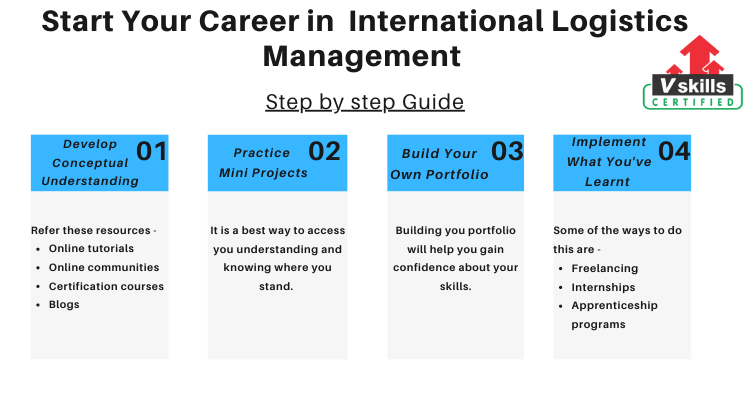Logistic managers and logistics management play a crucial role in companies because they ensure that suppliers receive the required raw materials and that finished products and services meet end users or some other desired destination. Logistics managers direct the company’s expansion. Any enterprise, large or small, requires a logistics manager. A small business owner might have only one logistician, but large corporations have different logistics and supply chain departments.
Let us know the career aspects of International Logistics Management!
What is Logistics Management?
Logistics management is a supply chain management component that is used to meet consumer demands by effectively moving and storing relevant information, products, and services from point of origin to point of destination. International Logistics management is the method of strategically managing the acquisition, movement, and storage of products, components, and finished inventory (as well as the associated information flows) through an organization’s marketing channels in order to optimize current and potential profitability through cost-effective order fulfilment round the world.
Why to choose this career?
Some reasons for which you many be inclined towards going into this field is as follows –
- Logistics is intertwined with almost every industry. In this sector, new opportunities are emerging.
- People at all educational levels have the potential to become excellent logistics managers.
- A logistics manager’s average salary is impressive.
- Working as a Logistics Manager allowed me to be more flexible with my schedule.
- You learn from a variety of industries.
International Logistics Management Career Opportunities
With a degree in transportation and logistics, you will have a plethora of job options. Some of the career opportunities are as follows –
Analyst
The most popular entry-level logistics job is analyst. Analysts are in charge of collecting and reviewing data in order to identify problems. Analysts are supposed to suggest ideas to their bosses, so they must have strong math and programming skills. They must also be able to work together in a team environment. An analyst’s tasks become more diverse and challenging as he or she gains experience, despite the fact that it is an entry-level job. As an analyst, you will gain a basic understanding of logistics planning that will be useful in a variety of more advanced roles.
Logistics Engineer
If an analyst performs well, he or she might be promoted to Logistics Engineer. Engineers perform similar tasks to analysts in that they examine supply chains and distribution processes for patterns or issues using computer systems and mathematics. If analysts make suggestions, engineers are in charge of putting those recommendations into action. They must be able to handle both their own tasks and those of analysts, as well as write technical proposals for their plans. Many transportation and logistics careers require management experience.
Consultant
Consultants work closely with clients to develop and execute logistics strategies for particular issues. This also necessitates the consultant acting as a free agent, going from city to city solving problems; however, many consultants enjoy the challenge. Project management is an important aspect of consulting; consultants must manage data to identify solutions, supervise the execution of such solutions, and ensure that clients understand specific supply-chain requirements for future independence.
Customer Service
Customer service representatives aren’t expected to have college degrees or even basic logistics experience, but the best customer service does. Customer support, whether working as a sales team or overseeing current customers, serves as a liaison between clients and the rest of the logistics team. Engineers or administrators must be informed of a client’s needs and concerns; similarly, if there is a logistical issue, the problem and its solution must be conveyed to the client. As a result, knowing logistics gives clients and customer service representatives a better understanding of the situation. Good customer service, like most jobs, inevitably leads to a promotion.
International Logistics Manager
Although international logistics managers are not in charge of material acquisition, they are in charge of maintaining relationships with international partners. International logistics necessitates a thorough understanding of constantly changing international customs, laws, and regulations. Such executives often begin their careers as importers and exporters, and they are expected to work closely with manufacturing, marketing, and purchasing to develop and manage supply chains. A good foreign logistics manager must be well-versed in both logistics and international business.
Inventory Manager
Inventory managers keep track of the gathering of resources and material products and look for patterns in the data. They are in charge of finding inventory issues and implementing solutions using data and information systems management. To optimize order and delivery schedules, inventory managers collaborate with buying and logistics managers. They typically have prior logistics and importing/exporting expertise.
How Can you start your career in Logistics Management?
It is important to have a good start with sufficient assets and learning material in order to be acceptable at anything. As a result, in order to be a pro in this area, your first steps toward learning must be sufficient. Let’s take a look at some of the things you should do to get started learning –
Step 1 – Learn about the basics and Develop Conceptual understanding
Before being an expert in any area, it is important to have a strong base. You must have sufficient applied knowledge even before you get your hands on the practical labs. It is necessary for everyone to begin somewhere. You must begin small if you want to have a good career in this area. You can get full information and a complete conceptual understanding by using the tools mentioned below –
- Firstly, Online Tutorials for Logistics Management
- Also, Certification Courses from verified sources such as Vskills, Coursera, Udemy and so on.
- In addition, Online communities
- Moreover, Blogs and study material from experts in this field and many more.
Vskills also provide Online tutorials, certification courses and free practice tests for the same. You can check them out on our official site.
Step 2 – Practice different Projects
You must practice if you want to be good. It’s also the most effective way to access one’s understanding and know where you’re headed in terms of putting what you’ve learned into practice. Getting some experience in practical aspects such as applying Logistics Management knowledge in projects will help you stand out from the crowd.
You can supplement your learning with the help of reading the blogs and tutorials by various sites which will help you to grasp a better understanding of the practical aspects.
Step 3 – Build Your Portfolio
Building your portfolio will help you gain trust in your abilities while also providing a forum for learning. Your portfolio reflects your ability to execute and schedule various logics, as well as how well you do in the areas of Logistics Management. These responsibilities should include a variety of projects and encourage readers to learn a lot.
Step 4 – Implement your skills in Real world
Execution of the ability you’ve mastered is vital because that’s why you learned in the first place – to perfect the skill! You must also remain up to date with latest technical developments and continue to work and improve your own skills. Any of the technical courses can also be used to show that you have a comprehensive understanding of advanced skills. You can put your talents to use in a variety of ways, including:
- Freelancing
- Internships
- Apprenticeship programs
Above mentioned steps will help you to get started in this domain. However, there is a long way to go. You can take up an advanced course to take your skills to a new level.
Average Salary and Market Demand
Vskills certified candidates are having good demand in Logistics companies like Punj Lloyd Ltd, PEMEX International, Mahindra Logistics, Gati KWE Pvt Ltd, DHL, TNT etc. The average salary of the logistics manager will depend on their profile and education qualification. There are some companies which also offers pay bonuses depending on performance.
| Profile | Starting Salary per annum (in INR) | Mid Level Salary per annum (in INR) | Senior Level Salary per annum (INR) |
| Logistics Manager | 2,39,000 | 6,19,000 | 20,00,000 |
Candidates can apply for a job as per their interest. Some of the sectors where they can apply are :
- Retail
- FMCG
- Manufacturing
- Freight
- Parcel
- 3PL
- Pharmaceuticals
- Healthcare
- eCommerce
- Food Industry
- Construction
Conclusion
A successful logistics manager will oversee the entire order cycle and process in order to boost business growth while also ensuring customer loyalty and long-term viability. A logistics manager’s weekly working hours vary from 50 to 60 hours. The majority of businesses who employ logistics managers work in shifts. A career as a logistics manager is an option for candidates who are involved in handling logistics-related activities. It should be noted that those aspiring to this role must be able to lead and manage a team, as well as have some experience managing multiple projects.
Get started and discover the career opportunities in the field of International Logistics Management. Hurry up and try free practice tests now offered by Vskills.in!



